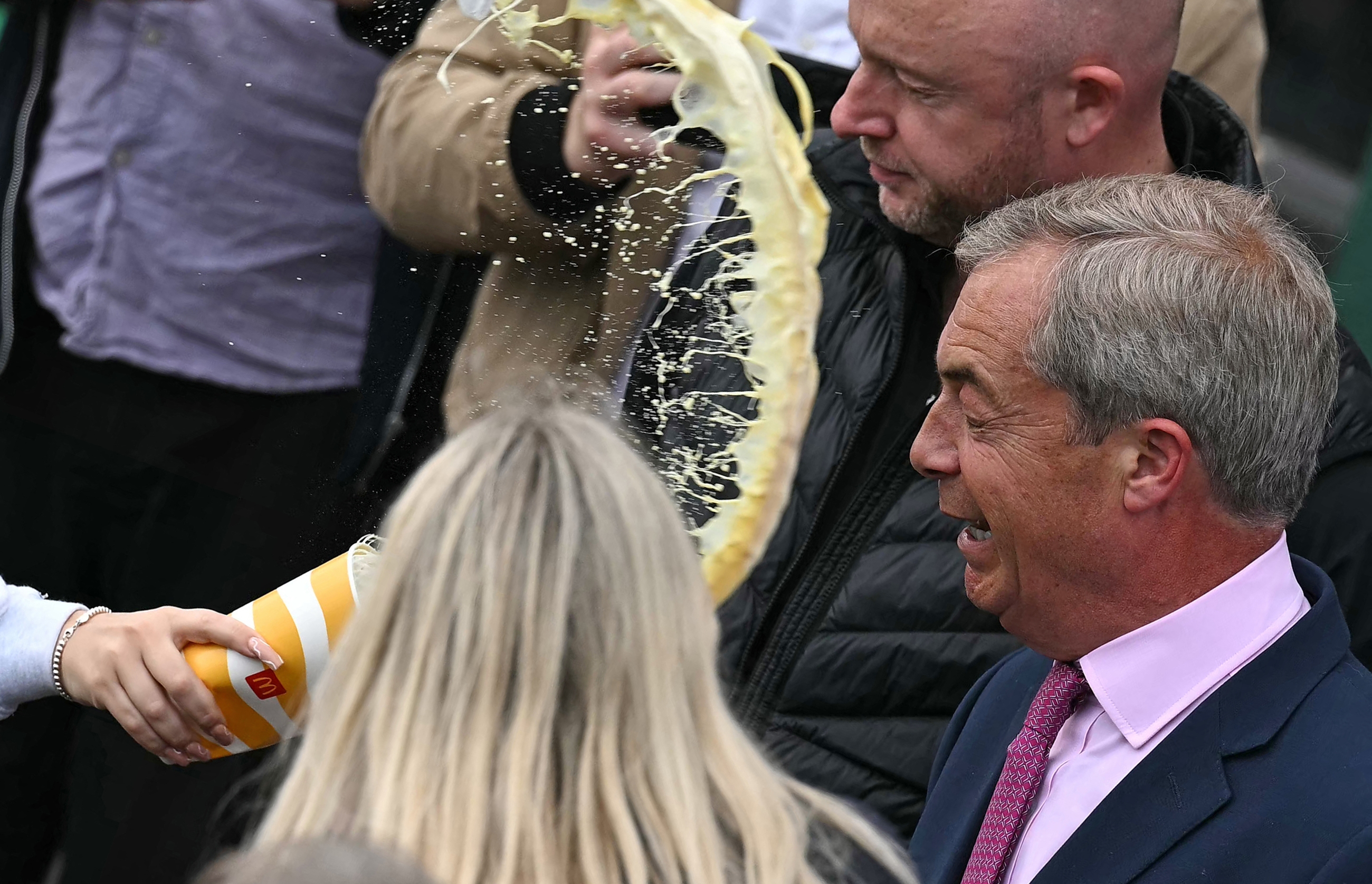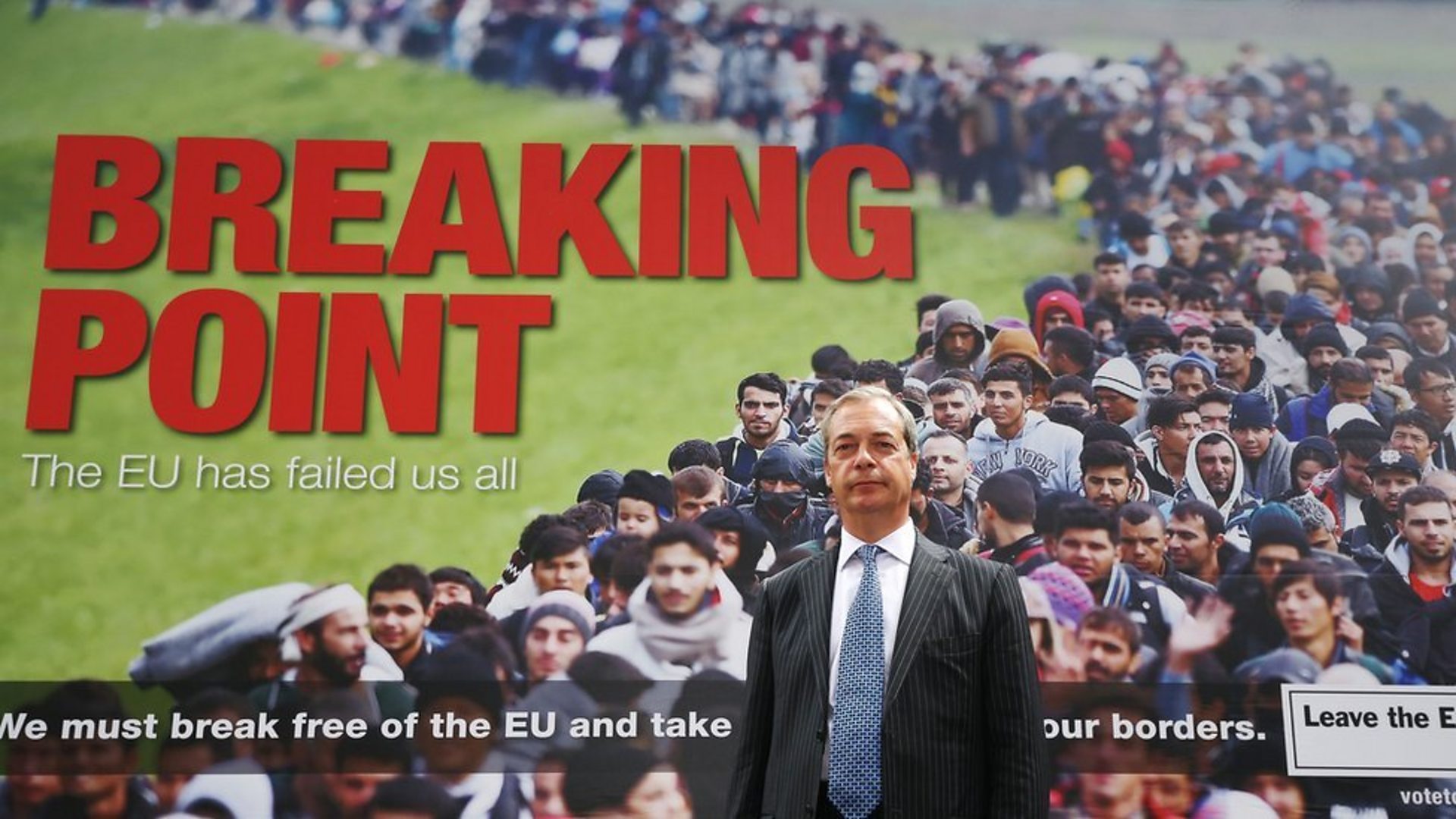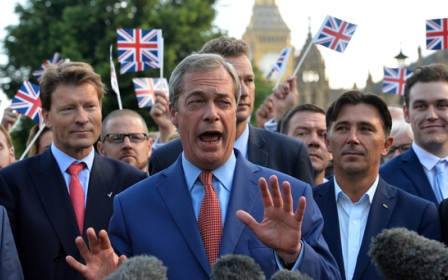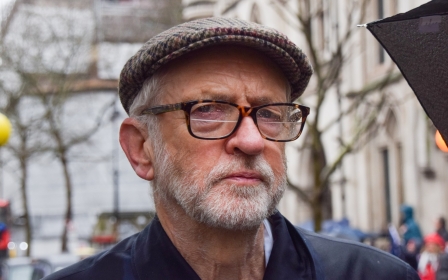Nigel Farage on Jews, Muslims, Palestinians and Israel: His most controversial quotes

After days of equivocation, right-wing UK politician Nigel Farage on Monday announced he is running for parliament in the upcoming general election. Immediately, he used media appearances to make controversial comments on Muslims, immigrants and Hamas.
Farage is one of Britain’s most controversial politicians.
Though he has stood unsuccessfully to be an MP seven times and has never had a seat in parliament, Farage is renowned as a driving force behind Britain's 2016 decision to leave the European Union.
In 1993 the former banker founded the right-wing UK Independence Party (Ukip), which was focused on opposing immigration and the EU. In 1994, he asked the infamous far-right politician Enoch Powell to back the party, but was turned down.
In 2019 he launched the Brexit Party, designed to ensure Britain had a "hard" exit from the EU. Later, the party rebranded itself as Reform UK and Farage took up a role as presenter on new right-wing TV channel GB News in 2021.
New MEE newsletter: Jerusalem Dispatch
Sign up to get the latest insights and analysis on Israel-Palestine, alongside Turkey Unpacked and other MEE newsletters
Reform UK is contesting seats across the country in the July general election, aiming to put pressure on the ruling Conservative Party by outflanking it on the issue of immigration .
Farage said he would not stand for parliament when the election was called. But on Monday this week, in a surprise U-turn, he announced he is becoming leader of the party again and will stand for parliament in Clacton, Essex.
Labelling this the “immigration election”, Farage vowed to be a “bloody nuisance” if he is elected. On Tuesday, he was nuisanced himself, hit with a banana-flavoured milkshake in Clacton after his campaign launch.
Over the years - and in recent months - Farage has made a series of controversial comments about a range of topics.
Since announcing his parliamentary candidacy on Monday, he has accused some Muslims of sectarian politics and a failure to integrate.
The Muslim Council of Britain told Middle East Eye that Farage is responsible for a “consistent pattern of Islamophobic, racist, and divisive rhetoric” and condemned his latest remarks on Muslims.
Meanwhile, Farage has attacked The Muslim Vote, a campaign backed by a coalition of civil society groups seeking to support political campaigns against MPs who failed to vote for a ceasefire in Gaza. Farage accused the political campaign of “dividing British communities”.
Middle East Eye takes a look at some of the politician’s most controversial comments over the years about Jews, Muslims, Palestinians and Israel.
Muslims 'coming here to take us over'
In 2013, Farage said that while some Muslim immigrants integrate into British society, which he supports, others are “coming here to take us over”. This stoked nationwide outrage, but Farage stuck by his position.
Muslims to blame for 'sharp rise in antisemitism'
In 2014, Farage said on his radio show that he had detected “quite a sharp rise in antisemitism” in Britain and across Europe: “What’s fuelling it is that there are many more Muslim voices, and some of those Muslim voices are deeply, deeply critical of Israel. In fact, some of them even question the right of Israel to exist as a nation.”
Muslims as a 'fifth column'
In 2015, Farage said public concern about immigration was rising because people believed some Muslims want to become “a fifth column and kill us”.
“There is an especial problem with some of the people who’ve come here and who are of the Muslim religion who don’t want to become part of our culture," he said.
“So there is no previous experience, in our history, of a migrant group that comes to Britain, that fundamentally wants to change who we are and what we are.”
The infamous 'breaking point' poster
One of the most notable moments of the 2016 Brexit campaign was when Farage posed in front of a poster depicting a line of non-white refugees, many of whom appeared Muslim, with a slogan reading “breaking point”. The move was widely condemned, including by Conservative campaigners for Brexit. Farage defended the poster.
'Jewish lobby' in the US
During a radio discussion in November 2017, Farage agreed with a caller who said the “Israeli lobby” in the United States was dangerous. Farage said “there are about six million Jewish people living in America, so as a percentage it’s quite small, but in terms of influence it’s quite big… In terms of money and influence they are a very powerful lobby.”
He expanded on the comment, saying that the “Jewish lobby, that has links with the Israeli government”, is a strong voice in America.
The politician was widely criticised by British Jewish groups and MPs. Farage did not apologise.
George Soros 'the biggest danger to the entire western world'
In May 2019, Farage described US Jewish-Hungarian financier and philanthropist George Soros as “the biggest danger to the entire western world” and accused him of wanting to reshape Europe’s racial makeup. A Brexit Party spokesman said the ensuing criticism of Farage was “lamentable” and “pathetic”.
Accusing Corbyn of engaging in antisemitism
Former Labour Party leader Jeremy Corbyn launched a legal challenge against Farage in March 2024, after Farage accused him of “subscribing to an antisemitic conspiracy theory”. Corbyn described the statement as “highly defamatory”.
'Growing prejudice against Israel' in public services
In late March, Farage expressed his surprise when Britain voted for a ceasefire in Gaza at the UN Security Council. Referring to this and an incident in which two Israelis were questioned at the UK border, Farage suggested there is a “growing prejudice against Israel and the people from Israel” in Britain’s public services.
He suggested there had been a “shift in our attitudes towards Israel and Israelis” from “[foreign secretary] Lord Cameron right the way down through Border Force and our public services”.
Asking how many Palestinian refugees would back Hamas
In May, after 50 MPs and peers called for Britain to take in Palestinian refugees escaping Israel's war on Gaza, Farage made his concerns known on his GB News show.
“I really wonder when it comes to Gaza, and I say that because if already 46 percent of the established British Muslim population are according to a recent poll supporters of Hamas, what would that percentage be of people that come from Gaza?" he said.
“I worry about integration, I worry about a group of people that come into the country with whom not only do we have nothing in common, but who support an organisation who is - from our perspective - a proscribed terrorist group.”
The study Farage cited about British Muslims was published in April, and has been accused of being “designed to spin-up support for Hamas as high as it could” and “generate sensationalised headlines”.
Young Muslims don’t share 'British values'
On 26 May, Farage came under fire after he said on Sky News: “We have a growing number of young people in this country who do not subscribe to British values, [who] in fact loathe much of what we stand for.”
The interviewer asked if they were talking about Muslims, to which the politician replied: “We are. … And I’m afraid I found some of the recent surveys saying that 46 percent of British Muslims support Hamas - support a terrorist organisation that is proscribed in this country.”
His comments were condemned by Labour, the Liberal Democrats and the Green Party.
Britain moving towards 'sectarian politics'
On 28 May, Farage said that Britain is moving towards “sectarian politics with women completely excluded” in its inner cities. He has repeatedly referred to Muslim independent political candidates as representing “sectarian politics”.
“When people come in large numbers, they bring their culture with them,” Farage said on GB News in early May after Muslim independent candidates made gains in local elections.
“What we are witnessing with this sectarian politics is an attempt to take over councils and win seats in the British parliament.”
Streets in Oldham 'where no one speaks English'
Farage doubled down on his comments about Muslims on Tuesday, after having announced his parliamentary candidacy. “I could take you streets in Oldham right now where no one speaks English,” he told BBC Radio 4 Today presenter Mishal Husain.
Husain asked him how he knew those people were not able to speak two languages, and whether his own children spoke a second language.
Farage, whose ex-wife is German, declined to comment.
Criticised by Muslim groups
The Muslim Council of Britain told MEE on Tuesday:
"The Muslim Council of Britain expresses profound concern over Nigel Farage's recent comments about Muslims in the context of the upcoming general election as the leader of Reform UK. Farage's history, marked by assertions that Muslims do not share British values and his endorsement of the 'basic principle' of Enoch Powell’s 'Rivers of Blood' speech, reveals a consistent pattern of Islamophobic, racist, and divisive rhetoric.
'His latest intervention in British politics has damaged the country and not achieved anything it set out to'
- The Muslim Vote
“Despite failing seven times in his attempts to enter parliament, Farage's relentless pursuit underscores a troubling commitment to fostering division and spreading hatred. The MCB strongly condemns Mr Farage's latest remarks on Muslims, asserting that it tarnishes our democracy when an individual with such overtly Islamophobic views is afforded a platform to disseminate hate."
The Muslim Vote, the political campaign that Farage accused of being sectarian, told MEE: “We will not be taking lessons about sectarian politics from a man who has spent the best part of his political career dividing British communities.
“His latest intervention in British politics has damaged the country and not achieved anything it set out to.
“Muslim Vote is proud to support candidates from all backgrounds who share our values on the NHS, investment into communities and opposing the genocide and apartheid of the Israeli government.
“This is not sectarian politics but an opportunity to break away from the broken and outdated two-party system.”
Middle East Eye delivers independent and unrivalled coverage and analysis of the Middle East, North Africa and beyond. To learn more about republishing this content and the associated fees, please fill out this form. More about MEE can be found here.





